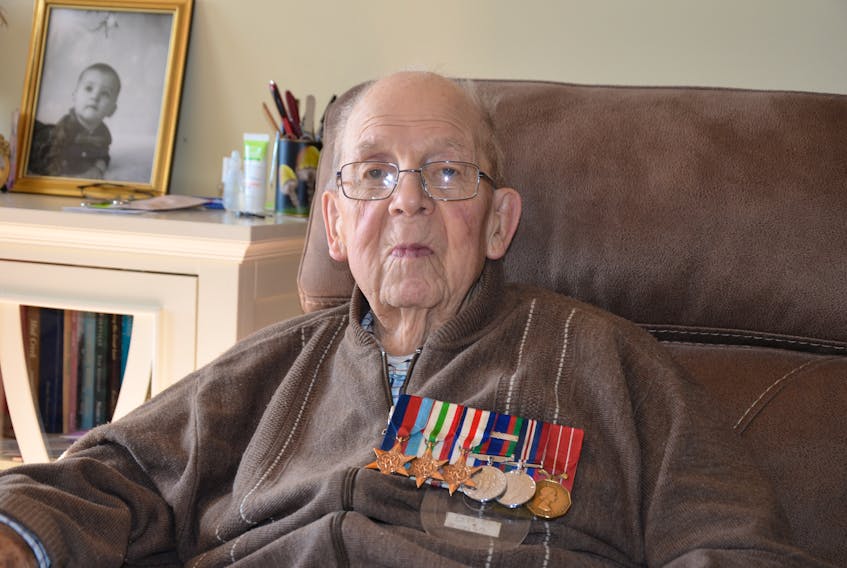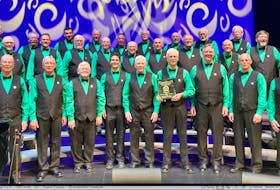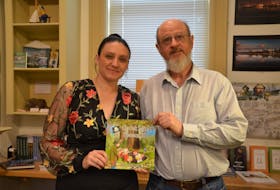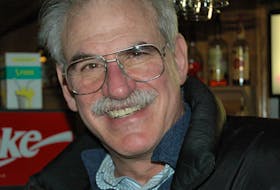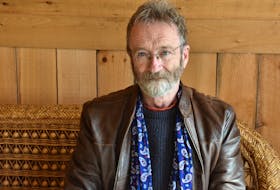KENTVILLE, N.S. — “I think wars are terrible, useless things. All they do is kill innocent people.”
This is why 96-year-old Gordon Hansford of Kentville, a former vocational school teacher, believes it’s so important for the younger generations to never forget the sacrifices made by Canadian soldiers in the First and Second World Wars.
“Wars do a lot of damage to a lot of people and they ruin a lot of lives,” the Second World War veteran said. “What do they accomplish? They destroy countries.”
Preparing to go overseas, Hansford was told his right eye wasn’t very good. He said this is probably why he’s still alive. Hansford studied to be an electrician and went overseas with the Royal Canadian Electrical and Mechanical Engineers.
He left from Hoboken, New Jersey, on the ship Empress of Scotland, formerly known as the Empress of Japan. With approximately 3,000 troops on board, they crossed the Atlantic alone in 10 days and 10 nights, using a zig-zag pattern to elude German U-boats.
“She was a beautiful ship, but she was overloaded, like all troop ships were,” Hansford said. “If we had been torpedoed by a submarine, maybe half of those would have survived. Maybe.”
Hansford landed at Liverpool early in 1943 and served in England for five months before going to northern Africa. He then went to Sicily, where Allied forces took control of the island in about a month, before moving on to mainland Italy and eventually France and Belgium.
Hansford said one of the worst battles they were part of in Italy was at Ortona. They lost 1,375 men in one week, including a friend of his from New Ross who had also served with Hansford’s father, Cecil, in the First World War.
Another terrible battle was near Cassino, Italy, where German troops had occupied a historic hilltop abbey. In capturing Monte Cassino, some 55,000 Allied troops were killed.
Hansford said that while he was in Italy, he was asked to take an armourer’s course. There were a lot of rifles that had been taken from wounded or killed soldiers that needed to be fixed quickly. He volunteered, as he was able to use his left eye, and a skilled armourer taught Hansford the trade.
“In about a week, he gave me an armourer’s course which normally would have taken at least a year,” Hansford said. “You had to do what you had to do.”
After serving in Belgium, Hansford moved on to serve in Holland for several months. With the end of the Second World War approaching, Hansford was serving in Germany.
At the end of the war, he said, Canadian soldiers weren’t allowed to mix with the Germans because of a fear of the Nazi SS. The SS, a major paramilitary organization under Adolf Hitler, was responsible for the murder of millions of Jews in the Holocaust. Hansford said the hatred the Allied troops held for the SS remains in his heart today.
“They were brutal bastards and they would drop you in your tracks in a second,” he said. “The ordinary Germans weren’t so bad.”
Hansford said he came down with various diseases while in Europe that had lingering effects. At the end of the war, he was admitted to the 24th General Hospital in England. He said they took good care of him there.
“I wasn’t always as good to myself sometimes, but, you know, the war’s over and you figure you can get away with a lot,” Hansford said.
He ended up coming home on the hospital ship the Lady Nelson with a collapsed lung and enlarged heart.
FOND OF ANNA
Hansford recalls being at an airport in Germany that had been used by the Nazis in the bombing raids on London. Behind the airport was a deep gravel pit. The military police would drive by, but they couldn’t see down into it. Hansford said, “we were doing black market stuff.” He said the Germans “loved our cigarettes and we liked their booze.”
Hansford said there was “a lovely young lady there” with “blue eyes and bright yellow hair” named Anna. He took quite a liking to her.
They got to talking but Hansford’s German wasn’t very good. After they were on a first-name basis, she asked if there was any way he could get her a German-English dictionary. Hansford told her that if there was any way, he would.
A few days later, Hansford found himself sweeping an orderly room. He spotted a German-English dictionary. He gathered some loose papers and threw them in the wastepaper basket. Hansford told the sergeant he was taking the papers outside to burn them.
When the sergeant wasn’t looking, Hansford used his broom handle to knock the book into the wastepaper basket. He then took the dictionary and gave it to Anna.
Anna lived on a farm and Hansford asked her if they had any eggs. He was unimpressed with the quality of the eggs they’d been receiving, and they were given only one a month. She said they did, and she invited him to visit the farmhouse later.
When Hansford knocked on the door, Anna’s mother answered. He didn’t know the German word for egg. Hansford got the idea to squat down and imitate a laying hen. Anna was behind her mother, laughing, and her mother left the room. Hansford soon realized that her mother had misinterpreted.
“After a while, she came with a roll of toilet paper,” he said.
Hansford had hoped to fill his beret with fresh eggs, but Anna gave him an entire woven basket full.
SURVIVING THE FIRST WORLD WAR

Hansford’s father, Cecil, served in the First World War and trained soldiers in the Second World War at Camp Aldershot. As a corporal in the Nova Scotia 25th Battalion, he was wounded twice in his three years of service overseas, the first time when he was only 17 years old.
In perhaps his closest brush with death, Cecil was walking down a road in a hollow when a shell blast buried him alive. The blast severed a wire that the nearby Gordon Highlanders were using for communications.
The colonel with the Highlanders sent men out in different directions to find and repair the break in the communications line.
“Two of them came and they saw this toe wiggling, that’s all they saw,” Hansford said.
The soldiers grabbed trenching tools and started digging. Eventually, they were able to grab Cecil under the arms and pulled him out. He was taken to the nearest hospital.
“Dad said it was just like a cork coming out of a bottle,” Hansford said. “If it hadn’t been for circumstances, he’d been dead.”
Hansford said he believes that is why his father named him Gordon, after the men who had rescued him.
“He never told me, but he didn’t think he had to,” Hansford said.
RELATED:

